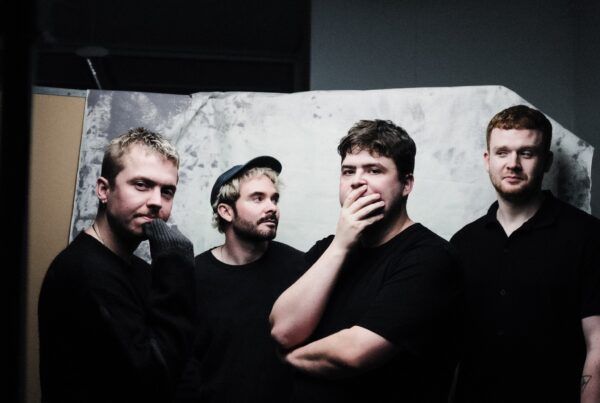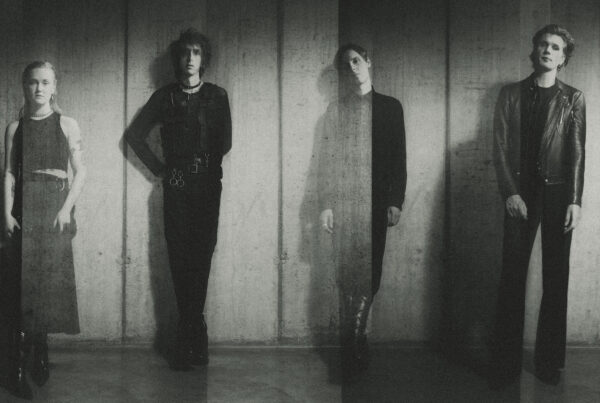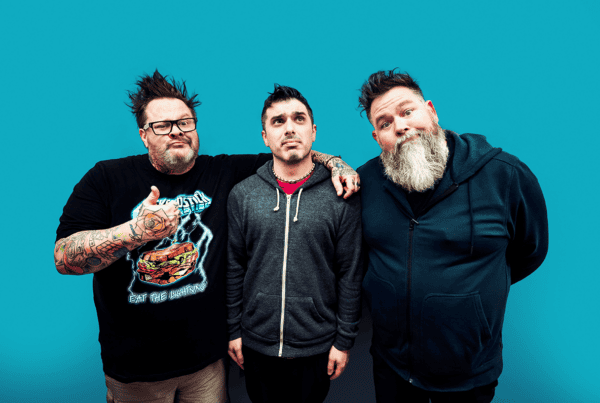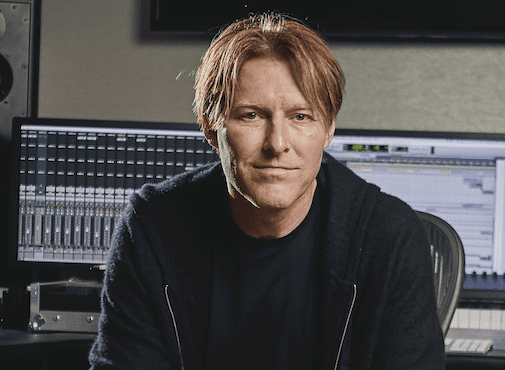In our latest interview, we sit down with Simon Glacken of Leeds-based music publicists I Like Press to talk about the evolution of PR in the music industry and how to successfully promote your band.
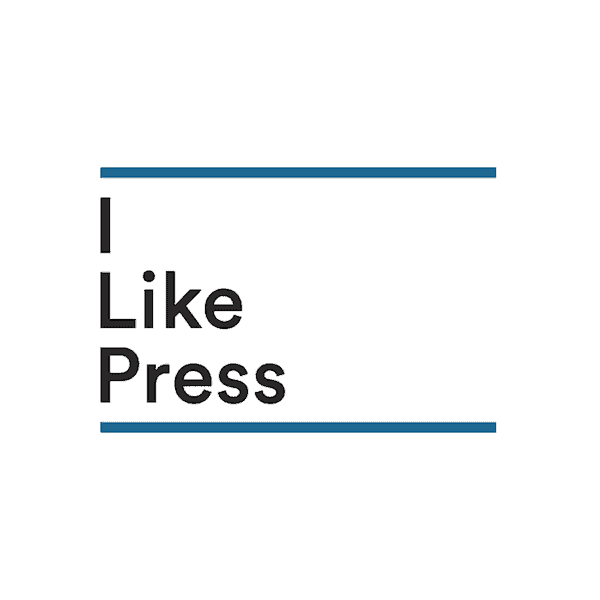
[like_to_read][/like_to_read]
S] How did you get into PR and why? What do you love about it?
SG] How I got into it was kind of an accident! I went to University and did a business studies course, which wasn’t really something I wanted to do. I just felt like I needed to go to uni but I didn’t know why. I just did a generic course then got a crappy job in an office. Then, me and a friend set up Brew Records in 2007, a DIY label. We couldn’t really afford anyone to do our PR for us at the time, so we did it all ourselves. I took on that role and did PR for us and the bands.
I didn’t really know what I was doing so I contacted friends from other record labels begin for contacts. In the beginning I did lots of things I shouldn’t have done, like sending whacky emails to people. After a few months I learnt to approach people on a more individual basis, and I then I started getting coverage in publications like Rocksound, Plan B Magazine, Artrocker, etc. Things progressed from there.
S] And this all came naturally from the Leeds music scene? You were helping these bands out?
SG] A lot of our earlier stuff was compilation albums of local bands from our area. We ended up working with a band called I Concur after we’d seen their videos on Youtube – we thought they were absolutely mental! We met them and ended up doing some singles and an album, and that was the release that took the label to the next level. Then we started working with bands like HumanFly and Black Alps and things really started to get going.
While we were doing all this, Simon Fogal who was in I like Trains told us that they had been dropped from their label, and when they were dropped they lost all their pluggers and PR people. So he decided to do his own PR and he called it I Like Press which is obviously a continuation of I Like Trains. The idea is, if you see a PR platform representing you it makes you seem a lot bigger than you actually are! It looks more impressive and professional. The others bands started asking us if we could do their PR and we started getting paid for it. We ended up working with Function Records and Maybe She Will and Shield Your Eyes…and it just grew and grew until I decided I was in a position to quite my office job and do this full time. So I just sat on my sofa and did PR all the time! After working with Mojo Fury we started correspondence with NME, and they started sending stuff our way which opened the door for us. I went from sitting on the sofa to working in our own office which was near The Reliance in Leeds.
It was a crap office, in the first week there was a giant hole in wall where they had to take out the heating system, so I was sat there in my coat in winter gritting my teeth saying ‘I have to do this, I have to do this!’. Then we moved into the much nicer Munro House where we are now, we’ve been there for about four years now. We have staff now and event someone who does the social media for our clients.
S] Were you and Simon [Fogal] mates? Did you just want to help each other out?
SG] Yeah, I knew him from the Leeds music scene from where I was a teenaged. I reviewed I Like Trains first single ‘Before the Curtain Closes’ I think, I gave it a five out of five. My girlfriend, who is still with me after all these years, was a big fan of theirs so we’d always go to see them play live. It’s a natural, fun relationship we have with the band and Simon.
S] In terms of building your own business, what was it like going from doing PR out of love to making a paid living from it?
SG] There’s obviously a lot more pressure because it’s not just your own reputation in your hands. It’s not your own band, not your own time, and not your own money you have be concerned with anymore. We as a PR company had to build up our own reputation so initially a lot of bands were kind of ‘testing us out’. We had to really work hard to prove ourselves worth the money.
S] It helps if your working with really good bands, people will inevitably pick them up!
SG] Yeah with a lot of bands you can tell exactly who will like them and who their target audiences are! But you have to be prepared for rejection. Often I’ll think I’ve cracked it and go to certain publications and they think that the music is boring. There’s nothing you can really do about that. Then sometimes the opposite will happen, when you listen to a band that you like but see no progression with, but a magazine will love them. Often it’s the luck of the draw! Everyone reacts to music in different ways.
S] What is the best part of the job for you?
SG] I don’t have to wear a suit anymore, which is awesome! It’s a bit of a cliche, but I love music and just being able to work with musicians is amazing. I get to be a part of the process and I love seeing people react positively to the bands who we promote. It’s always stressful beforehand but when I finally see a great feature about one of our bands it’s all worth it. I’ve had a few moments in KoKo [Camden] where I’ve been standing there looking at a sold out crowd singing and cheering and thinking ‘I was part of this’.
S] You’ve been doing this for a while now, we were wondering do you have a top moment in your career so far?
SG] I do love it when we get a sell out of a big show, I always try and remember them. When 65DaysofStatic played download in from of thousands and thousands of people, that was amazing. Sometimes its something really simple like just hearing a great album and getting excited to work on a campaign. I do this for myself and I enjoy my job and working for myself. I remember the days at my old job where id drag myself in and stare at the clock all day waiting to go home again, whereas now staying late is no problem because I genuinely enjoy what I do. Sometimes I take is granted like ‘ugh I have to go to a gig tonight’, and then I’ll stop and remember how great it is that I get to do that for work.
S] What’s been the biggest challenge for you being part of I Like Press so far?
SG] The biggest challenge is always trying to get people the listen to the music that we are promoting. When you work with bigger bands you know that people will listen by proxy, but it’s way harder to get people listen to lesser known local bands or more obscure bands. People are busy and don’t always make time for these smaller bands. The key thing with PR is you can’t be rude, so you can’t push people to listen to what you have to say. It’s hard to convince certain magazines to take chance on an interested pitch for a band they might not usually cover. You have to really take your time with the pitch and make it worthwhile. You might talk about what the band stand for, what their political views are, personal things like that, or you might focus on the specifics of a particular album. For instance if a band has done a soundtrack to a game or a film you can talk about the importance of the band across multiple forms of media, which is interesting.
S] What do you look for in a potential employee or intern to work with I Like Press?
SG] We sometimes keep interns on if they impress us with their work; they have to be keen and or course interested in the same kind of music as us. I remember once I put out an advert and said ‘Whoever turns up to the interview in a Darkthrone t-shirt gets the job!’. No-one did but I probably really would have given them the job!
It helps to have some experience, both with music and PR. Maybe you’ve been in a band and have some experience in promoting your music. The more knowledge of both industries you have, the better as far as i’m concerned. Enthusiasm and dedication are also really important. We had one guy who was so keen; he had to have a huge operation on his head but the next week he came into the office with a bandage wrapped around it and carried on! Then his Gran died, and he still came in! You couldn’t tell anything was wrong from the way he was working, he always worked really hard. This job requires you to be so flexible and always available and he really blew us away with his dedication.
S] Is it really all about ‘who you know’ in the music industry? How do you make those key connections?
SG] When it comes to the bigger magazines like Kerrang! it really helps to have solid connections. They get so many emails it’s easy for them to overlook things sent from PR companies they don’t know, so it helps to have a working relationship with a specific journalist at the publication you’re trying to reach. It also helps when you have great material for them to listen to. From there you can get an idea of what they’re into and send them similar things. Once you’ve built up that relationship you can start sending stuff that’s a bit more ‘out there’. It’s good to have a bit on banter going. I mean, there’s people I’ve been emailing for years and I still haven’t met, like contacts in London. I honestly think they best way to meet people is by getting involved in your local music scene, meeting bands, managers etc. After a while they’ll notice you at your shows and you can strike up conversation and start building those relationships.
S] What are the biggest PR mistakes you’ve seen people make?
SG] When I was in a band I made a lot of mistakes and I see other bands making exactly the same mistakes. Like they will email a bunch of people asking for promotion without instead of contacting people on an individual basis and building a solid connection. Spamming people is pointless because people just get annoyed. It looks very unprofessional. You need to tailor your emails to individuals and speak to them about things that are going to interested them personally. You need to do your research and make sure you’re contacting the right people. You don’t want to talk to Terrorizer about and indie band.
A lot of bands are too quick to get the music online. We work on campaigns and do track teasers, preview streams, it’s very gradual. We only release the full album at the end of the publicity campaign, so that people are eager to hear it, people know about it and really want to listen. There’s no point shoving it all on iTunes straight away because you have no profile, no one knows about it.
S] What kind of bands do you listen to on a daily basis? What inspires you?
SG] I mainly listen to heavy music, but I do have a soft spot for Johnny Cash. I listen to stuff like Black Mass, Neurosis, Godspeed You! Black Emperor, Nine Inch Nails, forward thinking metal. We actually got to work with Robin Fink [Nine Inch Nails, Guns ‘N’ Roses] when he did the soundtrack for the horror video game, Noct. The company who did the soundtrack phoned us up two weeks before the release and asked us what we could do. We managed to get a piece in Kerrang! which was great.
My music taste is really broad but my niche is definitely metal and harder music, so that’s the area what I’ve decided to work in for PR. I love The Melvins, Darkthrone, Warhorse, Pulver, so many more bands, I’ll be here for years if I try to list them all.
S] Is there a North/South divide when it comes to the music industry? Can it be overcome?
SG] A lot of the main magazines and labels are stuck in the South, but a few a spread out, like The Skinny in Scotland. I would never say to people, if you want to make it you have to move to London, it infuriates me when people say that. The amount of people who go down there and just get themselves into debt and come back broken is unreal. People who are doing the same job as me down there are earning the same wage and living in a shitty one room dive. It’s bizarre to me that so many of these record labels and magazines are based in London, where it’s really expensive to rent offices snd studios. Money is becoming more and more scarce in the music industry, so if they moved out a little bit it would make so much more sense. They could save so much money and their staff could live a better quality of life.
All you really need to do to work in PR is drive; you have to be prepared to put in that extra effort to build those key relationships, wherever you are working from.
S] Last question, what do you see for the future? What’s next for I Like Press?
SG] We are going to try and work to get more bands playing festivals, we want to expand our staff a bit more, work with more venues and food and drink, we want to grow these areas. In the music industry you never know where things are going to go, we might end up with bands we never thought we’d work with. International festivals would be great, to get more work in mainland Europe. As much as I love Beacons and other UK festivals, they are always cold and wet! At the end of the day, luck will lead us to new places and new sounds, every project opens up more connections and more doors.
Interview: Dom Smith / Transcription: Alex Inkey

